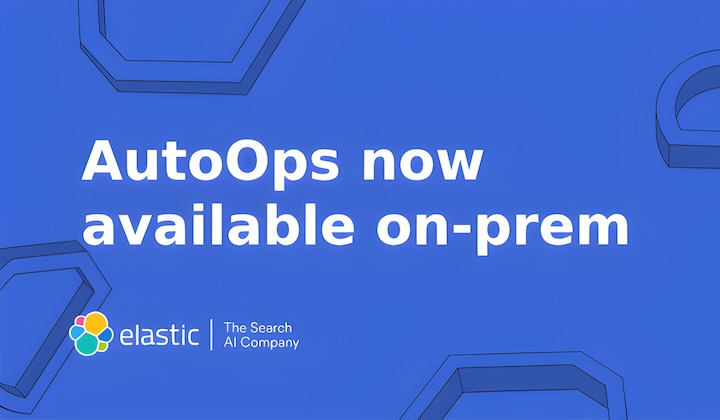AutoOps: Simple Elasticsearch cluster monitoring and management now available on-prem

Following the widespread adoption of AutoOps for Elastic Cloud Hosted launched in November 2024, we are excited to announce that AutoOps is now available for self-managed clusters, bringing simplified cluster management with real-time issue detection, performance recommendations, and resource utilization insights directly to your on-prem or privately hosted environments.
This release is designed to save your team's time by reducing administrative overhead and the manual effort required for performance tuning. With real-time issue detection and tailored recommendations, you can improve performance by pinpointing bottlenecks like slow queries, mapping issues, and unbalanced shards. Furthermore, AutoOps delivers clear resource utilization insights, enabling you to lower your total cost of ownership by identifying underutilized nodes and reducing unnecessary hardware costs
We’ve made connecting your on-prem environment to AutoOps incredibly simple with a quick setup process. It takes just a few minutes to link your self-managed cluster to your Elastic Cloud account. This seamless connection is your first step toward comprehensive monitoring and management.

AutoOps has already demonstrated a significant impact for existing Elastic Cloud customers. It has led to a substantial improvement in performance and system reliability, ensuring more consistent and dependable operations and overall simpler Elastic experience for its users.
Tipalti has achieved a remarkable 10% annual cost saving with AutoOps.
Oz Levy, data operations manager of Tipalti’s technical staff
Optimizing your self-managed Elasticsearch clusters
Running a powerful data platform like Elasticsearch locally provides complete control over your environment, but it also comes with the added responsibility of managing its operational complexity. This includes the continuous effort of performance tuning, proactive issue detection, and resource optimization to ensure you get the most out of your investment. Without dedicated tooling, these operational tasks can lead to over-provisioning, reactive fire-fighting, and a constant struggle to extract the maximum value from your Elasticsearch investment.
We have been on a mission to simplify this experience. That’s why AutoOps for self-managed clusters directly addresses these challenges by providing:
Simplified cluster management: AutoOps delivers real-time cluster insights, automatically detecting issues like ingestion bottlenecks, shard imbalance, and mapping errors so that you can resolve problems before they impact performance.
Tailored performance recommendations: Receive insights customized to your specific cluster configuration and usage patterns. AutoOps helps you pinpoint performance bottlenecks and provides actionable advice, such as suggesting sharding strategy adjustments or query refactoring to improve search speed.
Cost and resource optimization: Get clear insights into resource utilization to reduce hardware costs. AutoOps identifies underutilized nodes and inefficiently sized indices, enabling you to confidently scale your infrastructure and avoid unnecessary spending.
Better support: Elastic Support engineers’ read-only access to your AutoOps diagnostics makes support responses faster as well as more precise resolutions to your support tickets.
Simple, secure, and included in your Enterprise subscription
AutoOps is the first of many cloud services that will be available to self-managed customers via Elastic Cloud Connect, bridging the gap between your clusters and our cloud-native capabilities. Cloud Connect enables self-managed clusters to consume Elastic Cloud services without the operational overhead of installing and managing them in your own environment.
Getting started is straightforward. AutoOps for self-managed clusters is available at no additional cost for customers with an Enterprise subscription. To enable it, you simply create a free Elastic Cloud account and connect your self-managed cluster by deploying a lightweight Metricbeat agent. The agent only extracts and sends cluster metrics to Elastic Cloud, not the underlying data within your cluster, ensuring your data privacy and security are maintained.
Take the next step in streamlining your Elasticsearch operations. Connect your self-managed cluster to AutoOps and unlock powerful monitoring, faster troubleshooting, and actionable insights all in one place. Explore the AutoOps product page, including demos.
Create a Cloud account to connect your self-managed cluster. Read the product documentation to learn more.
The release and timing of any features or functionality described in this post remain at Elastic's sole discretion. Any features or functionality not currently available may not be delivered on time or at all.
In this blog post, we may have used or referred to third party generative AI tools, which are owned and operated by their respective owners. Elastic does not have any control over the third party tools and we have no responsibility or liability for their content, operation or use, nor for any loss or damage that may arise from your use of such tools. Please exercise caution when using AI tools with personal, sensitive or confidential information. Any data you submit may be used for AI training or other purposes. There is no guarantee that information you provide will be kept secure or confidential. You should familiarize yourself with the privacy practices and terms of use of any generative AI tools prior to use.
Elastic, Elasticsearch, and associated marks are trademarks, logos or registered trademarks of Elasticsearch N.V. in the United States and other countries. All other company and product names are trademarks, logos or registered trademarks of their respective owners.